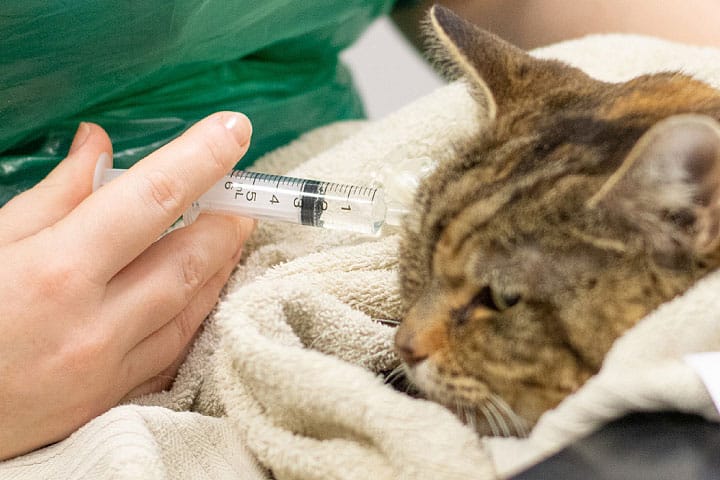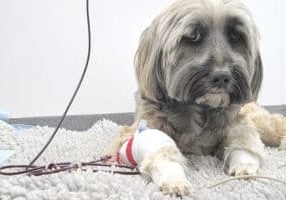
Antibiotic resistance is a serious concern facing both human and veterinary medicine, therefore it is vital that we use antibiotics appropriately. Here we present several conditions for which their use can be avoided, in the hope of increasing confidence when it comes to saying no to antibiotics.
Pancreatitis
In contrast to humans, dog with pancreatitis rarely have bacterial complications. The routine use of prophylactic antibiotics is therefore not recommended (Holm et al 2003, Steiner 2017). Associated pyrexia is likely due to sterile inflammation/peritonitis. Antibiotics should be limited to dogs that have a demonstrated bacterial infectious complication (e.g. aspiration pneumonia, pancreatic abscess). The situation in cats is considered to be the same, however antibiotics should be used in cats with proven neutrophilic cholangitis with secondary pancreatitis (Xenoulis 2008).
Acute Haemorrhagic Diarrhoea Syndrome (AHDS) in Dogs
This syndrome most commonly affects young or middle-aged small breed dogs. They present with acute onset haemorrhagic diarrhoea with hypothermia, tachycardia, haemoconcentration and a neutrophilic left shift but are typically not septic. The diagnosis is based on exclusion of other causes of acute diarrhoea. The causative agent is unknown (Dunowska 2017). The potential role of a Clostridium species is controversial, with several authors rejecting its role as a primary toxin in AHDS (Busch 2015). The use of antibiotics does not seem to influence the outcome (Unterer and others 2011, Unterer 2015, Mortier and others 2015). Antibiotics are not recommended for routine treatment of AHDS unless there is clear evidence of systemic inflammatory response syndrome (SIRS) or sepsis.
Immune-Mediated Haemolytic Anaemia (IMHA)
The vast majority of IMHA cases present with an inflammatory leukogram with pronounced leucocytosis, left shift and monocytosis. This reflects a marked regenerative response following stimulation of the bone marrow. Such patients commonly present with pyrexia secondary to immune stimulation. This is a sterile process and therefore antibiotics are not routinely indicated.
Pyrexia of Unknown Origin (PUO)
There are many potential causes of pyrexia other than bacterial infection. These include alternative infectious agents (protozoa, fungae, parasites), immune-mediated disease (such as immune-mediated polyarthritis and steroid responsive meningitis) and neoplasia. If antibiotic treatment is trialled for a PUO, a lack of response indicates that further investigations are required and not that further classes of antibiotics should be trialled. The use of fluoroquinolones and cefovecin should be avoided until a definitive bacterial cause is identified. If an anaerobic bacterial infection is identified, it should be noted that amoxicillin-clavulanate and metronidazole both have excellent anaerobic activity, therefore their simultaneous use for this purpose is not required.
Subclinical Bacteriuria
This is defined as the presence of a positive bacterial urine culture +/- pyuria, without clinical signs of a UTI (e.g. haematuria, pollakiuria, stranguria). The most recent veterinary guidelines advise that antibiotic treatment of such cases is not recommended (Weese et al 2019). Routine screening of urine from diabetic or Cushingoid cases is also not recommended, unless clinical signs of a UTI are present.

Case Advice or Arranging a Referral
If you are a veterinary professional and would like to discuss a case with one of our team, or require pre-referral advice about a patient, please call 01883 741449. Alternatively, to refer a case, please use the online referral form
About The Discipline
Internal Medicine

Need case advice or have any questions?
If you have any questions or would like advice on a case please call our dedicated vet line on 01883 741449 and ask to speak to one of our Internal Medicine team.
Advice is freely available, even if the case cannot be referred.
Internal Medicine Team
Our Internal Medicine Team offer a caring, multi-disciplinary approach to all medical and surgical conditions.